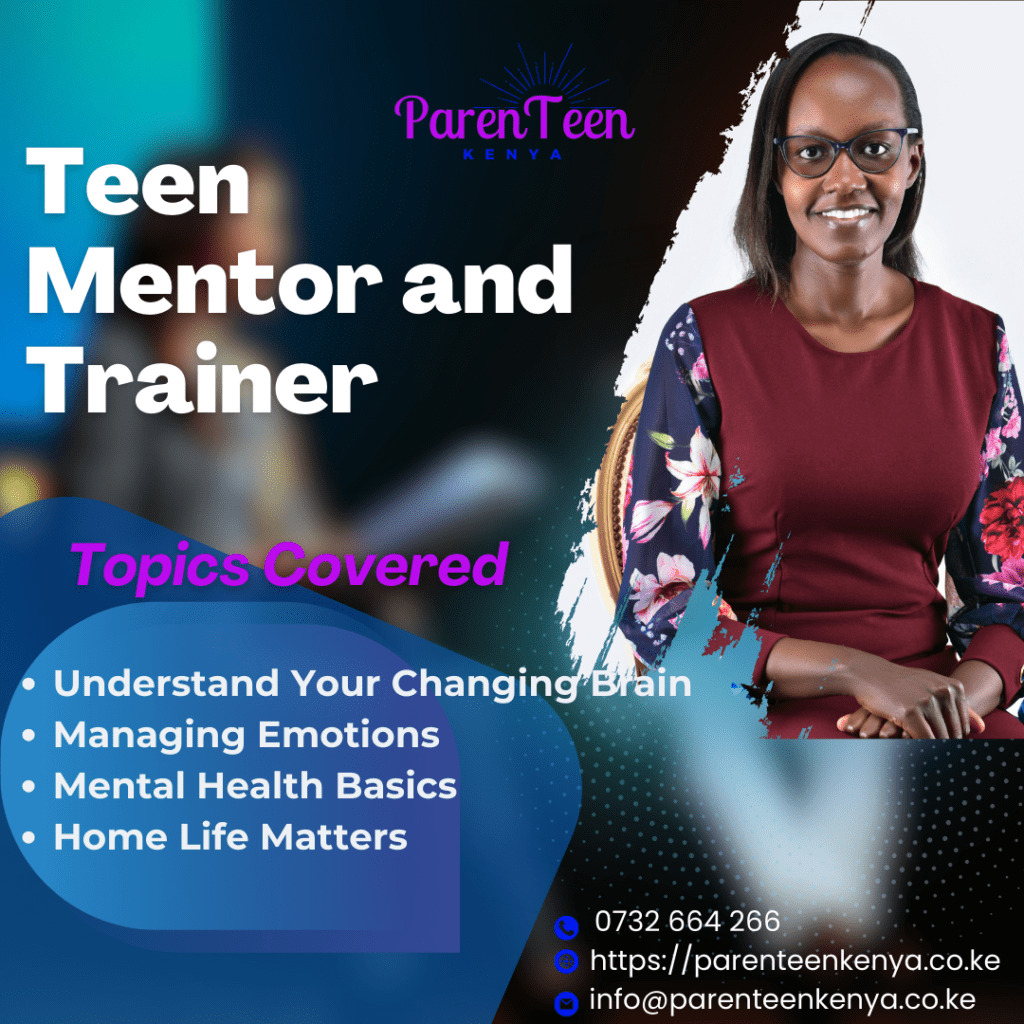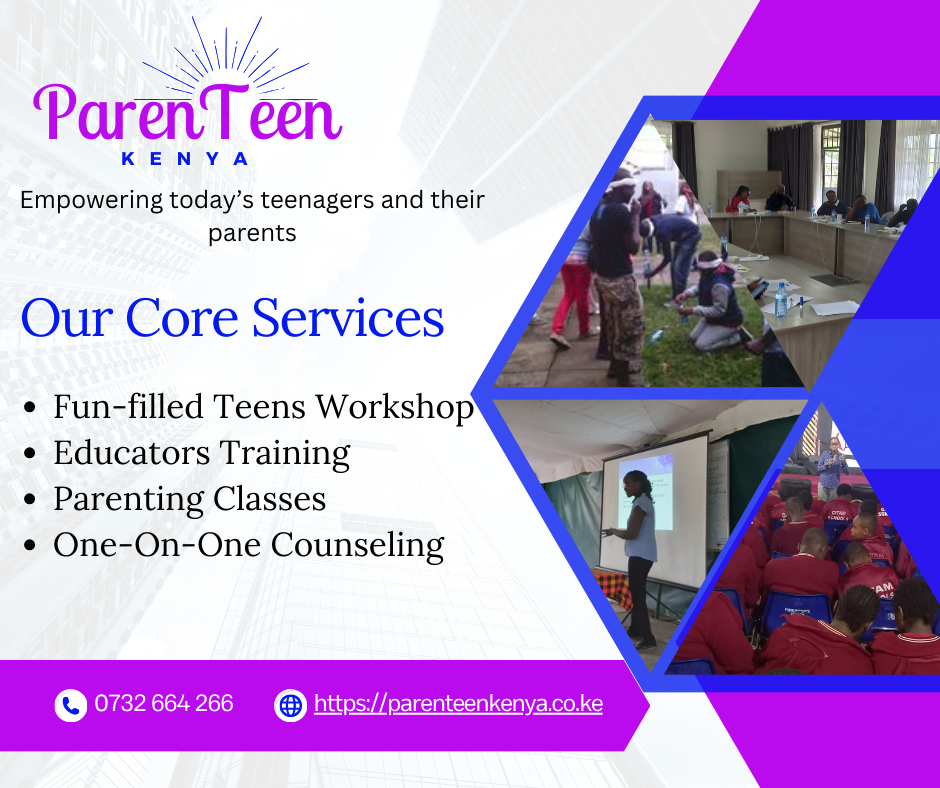Imagine standing at the base of a mountain, gazing up at its peak.
The path ahead looks steep, curvy, and sometimes a bit scary.
But you can also see breathtaking views, exciting challenges, and the promise of a fun journey.
This is how adolescence may feel like.
A time of growth, change, and discovery that can be both exciting and challenging.
To help you in this journey, we will discuss seven key challenges that you will experience or are already experiencing as an adolescent.
1 – Physical Changes and Body Image

One day, you may have woken up and suddenly realized your favorite jeans no longer fit.
Or your voice cracked unexpectedly during class presentations, or you noticed your chest changing or hair growing in new places.
That is puberty! The beginning of your body’s transformation from child to adult.
During adolescence, your body undergoes significant changes. For girls, this often includes breast development, widening hips, and the start of menstruation.
Boys experience voice deepening, facial hair growth, and increased muscle mass. Both genders deal with growth spurts, acne, and body odor.
These rapid changes can sometimes feel overwhelming. You might feel awkward or self-conscious about your changing body.
It’s common to compare yourself to others and worry about whether you’re developing normally.
Research shows that body image concerns are common during adolescence.
A study published in the Journal of Adolescent Health found that about 50% of girls and 30% of boys are dissatisfied with their bodies during this period.
You need to remember that everyone develops at their own pace. What’s “normal” covers a wide range. Instead of comparing yourself to others, focus on taking care of your body. Which includes:
- Eating a balanced diet
- Avoiding unhealthy snacking
- Getting regular exercise
- Practicing good hygiene
These habits will not only assist you feel better physically but can also boost your self-esteem.
If you’re struggling with body image issues, don’t hesitate to talk to a trusted adult, like a teacher, guardian, parent,, or school counselor.
You can also tell your parent to book a session with a professional counselor. They can provide support and guidance to help you develop a healthy relationship with your changing body.
2 – Emotional Regulation and Mood Swings
If you feel and believe your parent doesn’t get you, as you engage with this section, ask them to listen to the following video. You can also listen, as the first part will help you understand yourself.
Tecla sat at the dining table working on her math homework. One minute, she felt fine, even proud of solving a difficult problem. The next, she found herself on the verge of tears, overwhelmed by a wave of sadness she couldn’t explain. Later that evening, she snapped at her younger brother over a minor issue, feeling irritated beyond reason. As she lay in bed that night, Tecla wondered why her emotions seemed to be going out of control lately.
Tecla’s experience is common among adolescents.
The teenage years are often marked by intense emotions and mood swings that can feel confusing and overwhelming.
These emotional ups and downs are largely due to hormonal changes in your body, in addition to the stress of new experiences and responsibilities.
Learning to regulate your emotions is a crucial skill during this time. The following table outlines strategies that can help.
| Strategy | How To Do It |
| Identify your emotions | Practice naming what you’re feeling. Are you angry, sad, frustrated, or anxious? |
| Keep a journal | Writing your thoughts and feelings can help you think through them better. |
| Practice mindfulness | Techniques like deep breathingcan help you stay grounded when emotions feel overwhelming. |
| Exercise regularly | Physical activity is a great way to release tension and boost mood. |
| Talk to someone | Share your feelings with a trusted friend, family member, or counselor. |
| Get enough sleep | Lack of sleep can amplify emotional reactions. |
It’s normal to experience a various emotions. The goal isn’t to suppress your feelings but to learn to express them in healthy ways.
If you find your emotions are consistently interfering with your daily life, don’t hesitate to seek help from a mental health professional.

3 – Identity Formation and Self-Discovery
Who am I? What do I believe in? What do I want to do with my life?
These are questions that often take center stage during adolescence.
This period is crucial for identity formation—developing a clear sense of who you are and your place in the world.
Psychologist Erik Erikson described adolescence as a time of “identity vs. role confusion.”
During this stage, you try on different roles and explore various aspects of yourself to determine what fits best.
This exploration can involve experimenting with different styles, hobbies, friend groups, and belief systems.
It’s normal to feel uncertain or even confused during this process. You might find your interests and opinions changing rapidly.
One week, you’re passionate about environmental activism; the next, you’re considering a career in technology.
This exploration is healthy and necessary for developing a strong sense of self. Here are some ways to engage in healthy self-discovery:
- Try new things: Join clubs, volunteer, or take up new hobbies to discover what you enjoy and are good at.
- Reflect on your values: Think about what’s important to you and why.
- Set goals: Having personal goals can give you a sense of direction and purpose.
- Learn about your family history and cultural background: Understanding your roots can be an important part of identity formation.
- Seek diverse experiences: Exposure to different perspectives can help you clarify your own beliefs and values.
Identity formation is a lifelong process, but adolescence is a particularly important time for this exploration.
It’s okay if you don’t have everything figured out right away. The goal is to start developing a sense of who you are and what you stand for.
Related: 7 Common Fears You Experience as a Teenager That is Familiar to All
4 – Peer Relationships and Social Pressures

Teddy stood in front of his closet, feeling anxious about what to wear to school. His old friends had started hanging out with a new crowd, and he felt pressure to fit in. They were wearing expensive brands he couldn’t afford and talking about parties he wasn’t invited to. As he got ready, Teddy wondered if he should change who he was to be accepted or stay true to himself and risk feeling left out.
Do you relate to Teddy’s dilemma?
Peer relationships become important during this time, often taking center stage in your social world.
While these relationships can be a source of support and belonging, they can also bring challenges and pressures.
Peer influence plays a significant role, as your friends’ opinions and behaviors can greatly impact your own choices.
While this influence isn’t always negative, peer pressure can also lead to risky behaviors if not managed carefully.
Friendships often become more intense and complex during this time, and you might experience conflicts, changing friend groups, or balancing multiple friendships.
Like Teddy, you might struggle with balancing individuality and belonging, facing the challenge of wanting to fit in while also staying true to yourself.
Managing these aspects of peer relationships and social pressures is crucial to the adolescent experience. To rise above these challenges, consider doing the following:
- Choose friends wisely: Keep company with people who share your values and support your goals.
- Develop assertiveness skills: Learn to say no to peer pressure and stand up for what you believe in.
- Maintain diverse friendships: Don’t limit yourself to one group. Having friends with different interests can broaden your perspectives.
- Be authentic: Trying to be someone you’re not is exhausting and unsustainable. True friends will appreciate you for who you are.
- Limit social media use: Be mindful of how much time you spend on social platforms and how they make you feel.
- Talk to trusted adults: If you’re struggling with peer issues, don’t hesitate to seek advice from parents, teachers, or counselors.
While peer relationships are important, they shouldn’t define you. Stay true to your family and personal values and interests, and you’ll attract friends who appreciate the real you.
Learn More: Top Developmental Challenges in the Teenage Years (And Why They Happen)
5 – Academic and Career Planning
Emily was constantly asked questions about her next step after clearing high school. “What colleges are you applying to?” “What do you want to major in?” “What career are you interested in?” The truth was, Emily had no idea. She enjoyed both her science and art classes, but couldn’t imagine choosing one over the other. The thought of making a decision that could impact the rest of her life felt paralyzing.
Emily’s experience reflects a common challenge faced by many adolescents; performance in academics and career planning.
This period of life often brings increased pressure to excel academically while also making crucial decisions about the future.
Many adolescents, like Emily, feel overwhelmed by the expectation to have their entire future mapped out, even as they’re still discovering their interests and strengths.
They may worry about making the wrong choice or disappointing their parents’ expectations. Here are some key considerations for academic and career planning during adolescence:
- Explore your interests: Pay attention to the subjects and activities that genuinely engage you. These can provide clues about potential career paths.
- Set academic goals: Challenge yourself academically, but set realistic goals. Strive for improvement and personal growth rather than perfection.
- Develop study skills: Learn effective time management, note-taking, and study techniques.
- Seek guidance: Talk to school counselors, teachers, and family members about your academic progress and career interests.
- Consider extracurricular activities: Participating in clubs, sports, or volunteer work can help you develop important skills and explore potential interests.
- Research career options: Look into various career paths that align with your interests and strengths.
- Develop life skills: Apart from academic skills, focus on developing practical life skills like financial literacy, communication, and problem-solving.
It’s okay if you don’t have your entire future mapped out. Many successful adults changed career paths multiple times before finding their calling.
The goal during adolescence is to lay a strong foundation of skills, knowledge, and self-understanding that will serve you well regardless of the life path you choose.
Related: 3 Ultimate Study Hacks Every High School Student Should Know
6 – Family Dynamics and Independence
Lisa had always been close to her parents, but lately, things felt different. She wanted to go to a concert with her friends, but her parents insisted on going with her. “You’re too young to go alone,” they said. Lisa felt frustrated – she wasn’t a little kid anymore! But when she tried to explain this, it led to an argument. That night, as she lay in bed, Lisa wondered why growing up had to be so complicated.
Adolescence is also a period involving balancing between maintaining family connections and developing your own identity and autonomy. The following table explains the main areas of this challenge.
| Challenging Areas for Teens | What it Entails |
| Desire for autonomy | Want more freedom to make your own decisions and choices |
| Changing communication patterns | Conversations with parents might become more complex and filled with arguments |
| Rule negotiations | Questioning or pushing back against family rules that once seemed normal. |
| Responsibility vs. freedom | Parents may expect more responsibility from you while you’re seeking more freedom |
| Privacy concerns | Desire more privacy as you develop your individual identity |
To maintain a healthy relationship with your family members during this time, you must learn to express your feelings and desires respectfully and listen to your parent’s side of the story.
You should also show your parents that you can handle more independence by being reliable and trustworthy in the home—before making big requests like Lisa did.
Learn to also understand your parents’ perspective. They care about you regardless of how you may feel about them.
Seek to stay connected with them because they’re the ones who will be there for you no matter what.
7 – Handling Sexuality and Romantic Relationships

As you progress through adolescence, you may start experiencing new feelings of attraction and interest in romantic relationships.
These feelings are a normal part of growing up, but they can also bring confusion, excitement, and sometimes anxiety.
It’s important to approach this aspect of adolescence with maturity, respect, and a strong foundation of values. Here are some key points to consider:
- Emotional readiness: Romantic feelings and relationships involve complex emotions. It’s crucial to understand and manage your own emotions before entering into a relationship.
- Respect and boundaries: Learn to set your own boundaries and respect those of others.
- Self-worth: Remember that your value doesn’t depend on being in a relationship. Focus on developing your own interests, skills, and friendships.
- Family values: Consider your family’s values and expectations regarding dating and relationships. Open communication with your parents can provide valuable guidance.
- Peer pressure: Be aware that peers might pressure you into romantic situations you’re not comfortable with. Stay true to your own values and pace.
- Focus on friendship: Many lasting romantic relationships start as friendships. Focus on building strong, platonic friendships with peers of all genders.
Sexuality is not about having sex only. It’s about seeing yourself develop in every aspect (physically, emotionally, mentally, and relationally) and waiting until later to get into a serious romantic relationship that hopefully will lead to marriage.
Do not hesitate to contact ParenTeen Kenya for more guidance on how to handle the adolescent period. We can also come to your school to give talks on any of the above topics.
Jane Kariuki is a devout Christian, Clinician, Psychologist, and founder of ParenTeen Kenya. She authored an exceptional training manual used in her teens’ workshop and an instructional guidebook for her parenting classes. If she is not training, blogging, or counseling, Jane loves to spend time with her sweet husband and three children.








[…] Learn more: From Puberty to Adulthood: 7 Key Challenges of Adolescence […]
I think they start getting anti-social
Yes they do Lytton. They can no longer relate well with real people.
[…] you understand why these adolescent challenges happen, they become way more manageable. In this article, we’ll explore the most common […]